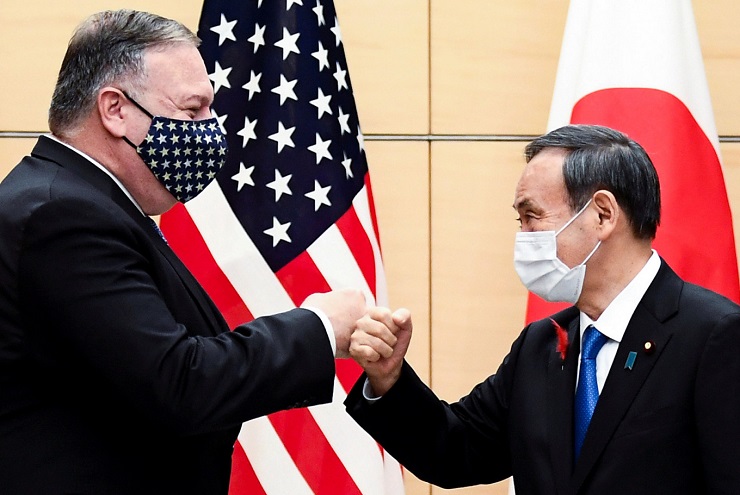Mike Pompeo lashed out at China in his latest visit to Tokyo where he met his counterparts from India, Australia and Japan as part of his efforts to revive the QUAD, a US-centered anti-China alliance of the four countries. Speaking to his counterparts, Pompeo said that there was an urgent need to counter China, adding that “As partners in this Quad, it is more critical now than ever that we collaborate to protect our people and partners from the CCP’s exploitation, corruption, and coercion.” In an interview given to a Japanese news outlet, Pompeo also said that the grouping was a “fabric” that could “counter the challenge that the Chinese Communist Party presents to all of us.” “Once we’ve institutionalized what we’re doing – the four of us together – we can begin to build out a true security framework”, he added further. Mike Pompeo, who was clearly on a mission to persuade his allies to join the military alliance, was obviously trying to make US allies sell the same anti-China discourse that the Trump administration has used at home to start a ‘trade war’ with China. The US, now aiming to expand the war, is recruiting allies; hence, Pompeo’s high-pitched speeches against China.
While Pompeo said what he had to say, prospects of the QUAD’s rise as a powerful military alliance or an ‘Asian NATO’ remain bleak. Its most important reason is the fact that none of the countries—India, Japan and Australia—are interested in picking up a military fight with China, while the US has no real allies against China.
While there is no gainsaying that all of these countries—India, Japan and Australia—have tense and uneasy relations with China, they appear least interested in formalizing a US led anti-China military alliance, thus making PRC their official enemy.
It explains why these countries have so far chosen to manage their relations with China on their own and continue to shy away from exacerbating the fault lines by joining the US bandwagon of a ‘global anti-China coalition.’
Consider this: while Japan has its economic ties with China and there is no will in Tokyo to ‘de-couple’, following the US in its footsteps, it, with an eye on China, still is increasing its military strength. Whereas it is already converting two of its existing ships into aircraft carriers, it is going to make a record increase in its defense spending as well. Japan’s Defence Ministry has asked for an 8.3 per cent increase in the defense budget, which is by far the country’s largest rise in last two decades. Interestingly enough, one crucial reason for why Japan has decided to increase the budget is the pressure that the Trump administration has been putting on the Japanese to manage their own national security. If Japan is anyway going to spend more and more on defense, increasing its military capability to position itself better in the region, not requiring extensive US military support, and it still wants to continue to have strong economic ties with China, there is no reason why it would want to permanently destabilize its relation with China by joining the ‘Asian NATO.’ Although this was prime minister Abe’s dream, his absence from the government will leave a further dampening impact on the alliance’s future prospects and Japan’s standing therein.
Australia’s government has announced a raft of legislation to curb foreign influence that is clearly (though unofficially) targeted at China. And India is actively engaged in a high-altitude, high-stakes game of chicken with China in the Himalayas—a hot-and-cold conflict in which India is no longer acting passively.
The fact that all of these countries have their specific problems with China and yet they have not been able to fully activate the QUAD shows there is no active and strong desire for a US-led military alliance. As such, the QUAD summit failed yet again to issue a joint statement or a communique.
Notwithstanding the US belligerence, the main focus of Japan, Australia and India remains a politically, economically and militarily balanced relationship with China.
This is the crucial reason that explains why, despite Pompeo’s hype and upbeat assessment of the ‘China threat’, none of the countries’ mentioned China directly in their statements issued after the meeting.
Unlike Pompeo, Japan’s Foreign Minister Toshimitsu Motegi notably did not mention China in his remarks, and the Japanese government was quick to clarify that the talks were not directed at any one country. Indian Foreign Minister Subrah manyam Jaishankar noted the fact that the meeting was happening at all, given the coronavirus pandemic, was “testimony to the importance” of the alliance. Accordingly, while India like Japan, did endorse the agenda of “free pacific region” and “rule-based system”, it did not mention China either. Certainly, Indian policy makers were not looking to further destabilize the situation in and around the Ladakh region. For Australian foreign minister, who also did not mention China, the essence of the QUAD was to “promote strategic balance” in the Indo-pacific (and not start an Indo-pacific military alliance).
Starting a military alliance against China does not make sense. If the US is these countries’ biggest military and security ally, China is by far one of the largest trading partners, which makes the summit more symbolic than substantive. Accordingly, while Pompeo was talking of creating a ‘security network’, Japanese officials confirmed to local media that the subject was not even raised in the meeting; for, such a venture is unlikely to gain traction in the wake of these countries’ main thrust for balanced ties with China.
In the absence of a clear will and desire for building up military pressure on China, the ‘Asian NATO’ will remain an engine-less rail car, one that even persistent kicks wouldn’t be able to ignite.
Salman Rafi Sheikh, research-analyst of International Relations and Pakistan’s foreign and domestic affairs, exclusively for the online magazine “New Eastern Outlook”.

